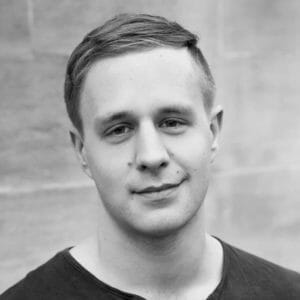Introduction
During this episode of Psychedelics Today, your host Kyle Buller interviews Robin Kurland-West, a licensed marriage and family therapist based out of California. Kyle and Robin chat about challenges and other questions in regard to providing psychedelic integration services. Psychedelic integration is a new territory, and there are plenty of questions to still answer and cover.
Show Notes
About Robin Kurland-West
- She offers integration services through her therapy practice.
- Robin had questions about how to create an introduction practice and how to follow up.
- She was licensed in 2010 and graduated from the California Institute of Integral Studies in 2006.
- About a year ago she decided to do a karma cleanse and began to talk to a friend about psychedelics.
- Her friend sent her a podcast that spoke to her.
- She was doing some shadow work and dealing with her addiction experiences.
- She said a prayer over the psilocybin and was open to what it would show her.
- A spirit appeared and the forest started sending her messages.
- It was a female spirit and used two trees to illustrate the inside of her brain.
- It taught her that her mind was holding onto negative beliefs.
- She taught her that she needed to let go, that it was “all so absurd.”
- What has been the difference between experimenting in college vs. doing the work as an adult?
- In college, it was seen as a party drug.
- She had a hard time having conversations with people.
- She doesn’t see it as a party drug anymore, it’s something that you honor.
- She now views it as a medicine that heals parts that have been cut off.
- Having had a history of addiction, some people are afraid psychedelics might be addictive.
- Psychedelics are non-addictive because other drugs are about escaping, and psychedelics are about being fully present.
- What is integration work for you and how do you approach it?
- This is new territory for her after having her own experience.
- She joined a network called the psychedelic support network.
- Because it’s not yet legal, it’s a bit of a struggle.
- She offers pre and post ritual services.
- People meet with her and do a pretty thorough assessment.
- They set the intention for the experience.
- Afterward they look at what some of the messages were and how to incorporate it into their daily lives.
- Do you help with dosage?
- She focuses more on intention setting because she’s still new at this.
- She refers people to resources to help with other things.
- Is there a therapeutic approach you use with people?
- She uses expressive arts therapy to tap into the unconscious and subconscious.
- She always uses family systems, there’s usually a root to behavior.
- She uses CBT and DBT.
- She uses journaling and narrative therapy.
- It’s an opportunity to rewrite your story - a new perspective to an old story.
- She uses mandala work and drawing.
- She has them stand up and move around.
- Utilizing movement to integrate is huge.
- After having her profound experience with psychedelics, she finds it to be a warm blanket she can reach for to remind you that things are different now.
- What type of challenges have you had providing integration services to people?
- She wants to know how soon she should see a client after they start on this journey.
- How many times should she see a client after, and how many times?
- It could be more individual.
- She started to do psychotherapy to go deep and heal.
- It’s possible to put your medical license at risk by providing certain services.
- She can’t sit with people when they have their experience and has to be clear that it’s a decision that they’re making.
- She has to detach herself from a lot of it.
- She likes the idea of immediacy in following up with clients.
- She sees a client 3-4 times beforehand to make sure they’re healthy enough and set intention.
- Afterward she wants to see them soon so they can hold onto the gold they discovered in the journey.
- How do you choose the right psychedelic experience for a person?
- The idea of doing a diagnosis to find out what will work is tricky.
- Throw it back on the person to see what they’re looking for.
- It’s not a scary experience, but you want to make sure you’re with someone who’s trained.
- There’s a couple that wants to come in and do integration therapy together.
- She wants to meet with them individually and together beforehand.
- People are in therapy to discover themselves and they might find something different than they’ve been looking for.
- How do you approach people who think integration specialists can get them drugs or be a guide during experiences?
- She says it isn’t about her telling them to use illicit drugs and she doesn’t do drugs with them or hook them up.
- The difference between integration therapy and a guide:
- A guide is someone you trust who sits with you.
- An integration therapist is just pre and post where she’s not involved in the drug.
- Have you had any clients reach out trying to integrate a really difficult experience?
- Not yet, but she’s looking forward to it.
- She would ask questions about what they saw and felt.
- She would bring in the arts to map it out and they can look at it together.
- You can have a psychedelic experience without having psychedelics.
- Is there anything you’re looking forward to with clients?
- In traditional therapy right now, she’s coming up against blockage in some of her clients.
- She sees a lot of people being stuck, and that’s the hardest part.
- She’s excited to see the light turn back on in people’s eyes and see them be healed.
- She wants to see people be present with themselves and each other so they can have a fuller life.
- How do you approach therapy and coaching?
- She just does the psychotherapy, asking questions.
- She appeals to a clients inner resources.
- Do you do any online work?
- She only does in-person work, every once in a while she does a phone session.
- She works holistically, so people don’t just focus on the mind, also the body and the spirit.
- Do you get people reaching out from all over the place?
- Yes, because her name is on the psychedelic support list.
- She filled out an application and had some correspondence with the organization.
- What are some of your favorite podcasts and resources?
- The Psychedelic Salon Podcast
Episode Quotes
- I don’t see psychedelics as a party drug anymore, it’s something that you honor, a medicine.
- I like to see my clients soon after their experience so they can hold onto the gold they discovered on their journey.
- People are in therapy to discover themselves and they might find something different than they’ve been looking for.
Resources Mentioned
So, You Want to Find a Psychedelic Guide - Article Psychedelics Today Episode with Katherine MacLean Joe Rogan Experience interviewing Amber Lyon 8 Common Psychedelic Mistakes Course Erowid Archive The Psychedelic Explorer’s Guide - Risks, Micro-Dosing, Ibogaine, and MoreAbout Robin Kurland-West, LMFT
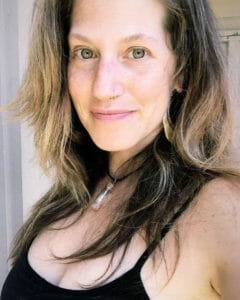 Robin Kurland-West received her license in 2010. Prior to becoming licensed she has worked in non profit agencies and inpatient recovery centers as clinical director, supervisor and lead therapist. Through this journey she has focused her expertise on trauma and addictions. Currently Robin has a private practice in the Sacramento area and works with individuals, families, couples and groups. Her passion to explore consciousness and the healing potential of psychedelics has been prominent through out and is committed to making a difference with those suffering from PTSD and addictions through the use of plant medicines and psychedelic integration therapy.
Robin Kurland-West received her license in 2010. Prior to becoming licensed she has worked in non profit agencies and inpatient recovery centers as clinical director, supervisor and lead therapist. Through this journey she has focused her expertise on trauma and addictions. Currently Robin has a private practice in the Sacramento area and works with individuals, families, couples and groups. Her passion to explore consciousness and the healing potential of psychedelics has been prominent through out and is committed to making a difference with those suffering from PTSD and addictions through the use of plant medicines and psychedelic integration therapy.
Download During this episode of Psychedelics Today, your host Kyle Buller interviews Duli Wilkins, aka the “Beantown Ghetto Shaman” about his work and future plans. In this conversation, Kyle talks to Duli about his work with sacred plant medicines, how he got involved in this type of work, and also explore the topic of people of color and diversity in the psychedelic world.
Show Notes
- About Duli Wilkins
- He’s from the Boston area born and raised.
- He gives credit to his parents for getting him into what he’s into right now.
- His dad used to play jazz music and met a bunch of famous musicians.
- He learned that sound and frequency can be used as a tool for healing.
- He lived between two warring projects.
- A lot of his friends got into the gang life.
- He got heavily into Tai Chi and Chi Kung.
- He became a multi-dimensional healer
- He had a friend who gave him a mushroom and that’s when the magic begins.
- How did everything begin for Duli?
- His empathic abilities heightened more when he used cannabis.
- He started getting deeper into the teachings of Rastafarians.
- In the black community, you didn’t see a lot of people using psychedelics.
- Using a mushroom was very new to him.
- Duli's experience with mushrooms?
- At first he just felt some tingling and checked on his friend looking at the painting.
- He started to see things happen before they were happening.
- He was seeing the fabric of reality.
- He started having out of body experience and heard drumming from the heavens.
- "What was it like for you to be involved in this work when the people around you aren’t?"
- Things are changing, more people across the globe are becoming aware of the benefits of teaching plants.
- A lot of people report seeing ancestors that have passed away.
- There’s a resistance to psychedelics in the black community because of the history of drugs.
- It was easy for the government to shut down everyone but their own children.
- We have to be patient and time will bring things to the surface.
- Discussion about the pharmaceutical system.
- It’s great when you have a broken bone, etc.
- The pharmaceutical establishment is a business and it runs like a business.
- When we deal with ancestral memory or epigenetics the medical industry can’t touch it.
- Safety in a teaching plant ceremony is key.
- Discussion about the dark night of the soul.
- Work in the shadow is important if you want to become whole.
- We’re all walking around with trauma.
- He’s had a lot of past life experiences, even one where his son died very young.
- It takes a lot of courage to try psychedelics and you have to have a good setting.
- "Do you see a lot of spiritual bypassing?"
- Yes, people try to hide behind things.
- Some people hide behind the psychedelics.
- Psychedelics and teaching plants are tools, how are you using the tools?
- When we deal with wealthy people, maybe it’s the lack of struggle to obtain psychedelics.
- There’s much more to us and as time goes by we’re going to have disclosure.
- Duli talks about some experiences with extraterrestrials during psychedelic trips.
- We’re going through cycles and making the same mistakes every time.
- Last words?
-
- Find him on Facebook under @abdukwilkins
- Find him on YouTube under The Beantown Ghetto Shaman
-
Sign up for our free online course
Episode Quotes
- Something inside me said, I should take the mushroom and that was the gateway to shamanism.
- Things are changing, more people across the globe are becoming aware of the benefits of teaching plants.
- We have to have a re-education and awareness around teaching plants.
About Duli Wilkins, a.k.a Duli Tha Beantown G.H.E.T.T.O
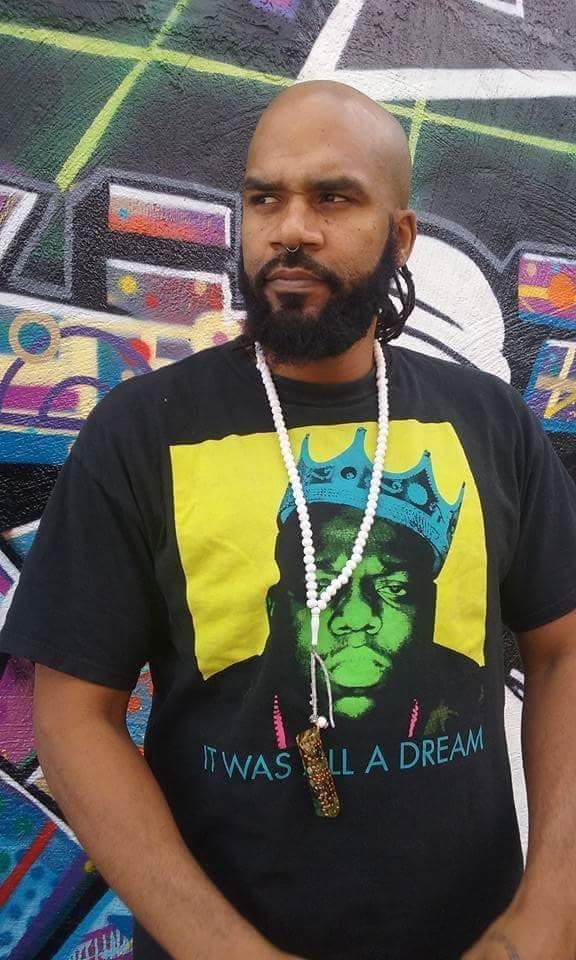
Abdul K. Wilkins a.k.a Duli Tha Beantown G.H.E.T.T.O (Gifted. Hearts. Equal. Towards. Total. Oneness) Shaman is a Boston Native...He grew up in the Inner City of Roxbury where he overcame an environment of gang street violence, neighborhood drug abuse, and police brutality! Duli was influenced at a young age by both of his parents in the interest of spirituality, mysticism, natural healing etc.
While attending College at Northeastern University he had a very mystical experience with psilocybin mushrooms and has been using mushrooms and other psychedelics as a tool for healing and conscious awareness ever since! He is a father of 2 and does massage therapy and natural healings in his community!
Kyle and Joe interview Robert Forte who has been around the psychedelic world for decades as a writer, facilitator and researcher. He has known or has worked with most of the biggest names in psychedelic history including Dr. Stanislav Grof and Timothy Leary among others.
The interview covers a lot of ground and will likely ruffle some feathers.
Robert has extensively studied the history of psychedelics and has drawn some conclusions about the origins of the field.
Psychedelics as Weapons
From the early days, scientists have been working with psychedelics to weaponize them. From project artichoke to MK Ultra, the US government and many foreign governments have spent a tremendous amount of effort researching these powerful compounds and likely still are.
Robert states that various governments particularly the United States government have groups that are using drugs to derange the public to make it easier for these groups to meet their desired outcomes - less democracy, increased plutocratic power, etc. Think Brave New World and Brave New World Revisitied.
Deranged from Miriam Webster:
- My leg was propped up on a library chair at the time, as it was too deranged to bend.
3: wildly odd or eccentric
He makes a compelling argument, but we want you the listener and reader to "Think for Yourself and Question Authority". That was a Leary line that we think is valuablein situations like this. Read books on the subject, question the purpose behind them, think critically and see where you want to go with it.
After recording this interview Joe Moore read the amazing and comprehensive 2016 history The Devil's Chessboard: Allen Dulles, the CIA, and the Rise of America's Secret Government. The book filled in some gaps for me (Joe) but didn't really change my mind much on the topic of psychedelics specifically.
Please enjoy the episode and if you want to discuss it, please join us at our facebook group here.
Links & Show Notes
- Colin Ross - Researcher Psychiatrist
- John Potash | Drugs as Weapons Against Us
- MK Ultra - https://en.wikipedia.org/wiki/Project_MKUltra
- Acid Hype -American News Media and the Psychedelic Experience (History of Communication)
- Henry Luce
- Theodore Shackley - CIA Officer
- Reinhard Galen
- Samuel Russell - Russell Trust opium \ skull and bones
- Brave new world revisited - https://www.huxley.net/bnw-revisited/
- Entheogens and the Future of Religion
- The Devil's Chessboard
- Allen Dulles
- 10 Global Businesses That Worked with the Nazis http://www.businesspundit.com/10-global-businesses-that-worked-with-the-nazis/2/
- JP Morgan Bank complicit in financial crimes in WWII
- The Politics of Heroin: CIA Complicity in the Global Drug Trade
- Mossad
- Israeli Mafia
- One Nation Under God: The Triumph of the Native American Church
- J. Tony Serra (born December 30, 1934) is an American civil rights lawyer, activist and tax resister from San Francisco - https://en.wikipedia.org/wiki/Tony_Serra
About Robert Forte
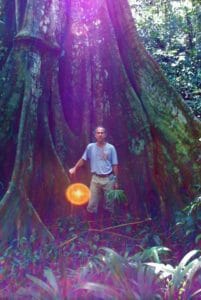
James Fadiman calls Robert Forte, “a major but not well known hero of the psychedelic movement.” A scholar, editor, publisher, professor, researcher of the subject for over 3 decades, Forte has come to some disturbing realizations about the psychedelic renaissance that he helped to start. Huston Smith called his first book, Entheogens and the Future of Religion, “the best single inquiry into the religious significance of chemically occasioned mystical experience that has yet appeared.” Forte was introduced to psychedelics in 1980 by Frank Barron, who initiated Timothy Leary and started the Harvard Psilocybin Project with him. From the University of California Forte was invited to Esalen to study with Stanislav Grof, before going to the University of Chicago to study the history and psychology of religion under Mircea Eliade. Over the years Forte has worked closely with many of the most prominent leaders of the psychedelic movement, including R. G. Wasson, Albert Hofmann, Timothy Leary, Ralph Metzner, Alexander Shulgin, Claudio Naranjo, and many others. His early MDMA research in 1981-85 turned on 100s of people to this new medicine. Though this project led to the creation of MAPS, Forte is a vocal critic of MAPS government collusion and deceptive policies. His second book is a rounded view of Timothy Leary, Outside Looking In: Appreciations, Castigations, Reminiscences. He first experienced ayahuasca in 1988, and conducted ayahuasca research with cancer patients in Peru, yet he is now suspicious of the globalizing of ayahuasca as an form of “spiritual colonialism.” He is a enthusiastic supporter of conscious, independent psychedelic healing and recreation, and an equally fierce opponent of psychedelics for mind control, profiteering, and social engineering by political and economic elites.
Episode Quotes
- I find mystical poetry to be an amazing aid in ceremony work.
- Is it the vision or the emotion that you feel and then the vision comes?
- In my work, the psychedelic experience is about going beyond the visionary state.
- The core of all creation is in the heart and breath.

Show Notes
- About Dr. Richard Grossman
- Has a long background in healing.
- He used to be a macrobiotic chef.
- Primeval meditations and licensed acupuncturist.
- Works with ayahuasca and San Pedro.
- How did Richard get involved in ayahuasca?
- A friend brought some up from Peru and his life changed in one night.
- It took him years as an acupuncturist learning more about healing.
- He’s been doing this for about thirty years.
- Do you integrate your acupuncture practice into ceremony?
- Not so much with ayahuasca - that’s done traditionally.
- He had a lot of experience with the Shipibo Tradition.
- With the San Pedro method, the body change happens in one day.
- Opinions on psychedelic visions.
- Many people want them and they’re a distraction.
- The real thing is that the source of everything is within.
- If a person can experience that for an instant, their life changes.
- There are a lot of things happening on subtle levels.
- The psychonaut and healing processes are quite different.
- What are some examples of ideas you’ve seen in the psychedelic community?
- People trying to draw in gods and goddesses.
- You need to see how deep a human being can go, it’s an infinite journey.
- What is it like to go deeper and deeper?
- If you can imagine a series of curtains parting over and over and over again.
- You begin to see places of illusion.
- During one of his trips, he visualized himself in a Nazi concentration camp.
- A voice told him to trust and forgive.
- He began to question what forgiveness and trust mean.
- Some people are seeking spirituality and not really healing within.
- Ayahuasca tourism is a fairly good thing, rather than people coming and ruining the jungle.
- How would you define a healing process?
- It’s a complex subject, he likes the idea of a series of concentric circles.
- Do you work with a person’s energy?
- People get very relaxed.
- If there is someone who can’t get relax he calms them with acupuncture.
- Do you think intoxicants affects the chi?
- San Pedro or ayahuasca are not considered intoxicants.
- He sees that ayahuasca is only good for the body.
- Psilocybin has a rough effect on the liver.
- The tannins in ayahuasca are valuable and bind toxins in the body.
- Do you have to worry about any cardiovascular problems?
- It is a stimulant so he screens people before doing the ceremony.
- Beauty is a healing process, beauty heals.
- Is there anything you’re excited about in the psychedelic world?
- When the community comes together to heal it’s powerful.
- We’re all going to a place of more love, peace, joy, and healing.
- What’s the outcome of thousands of people experiencing love and joy?
- What’s the ayahuasca ceremony structure?
- Constant music, keeping things from going totally wonky.
- There’s a point in the ceremony that it could go in either direction:
- Total group insanity or total group healing.
- Iowaska ceremonies can be dangerous.
- It’s something to be respected with its own spirit.
- You must hold close to the traditions of generations.
- There’s always a point during the ceremony where he feels it’s the most important and beautiful place he’s ever been.
- Drama’s not necessary, our culture wants the drama.
- We need to outgrow externalizing the blame.
- Life in our heart is meant to be enjoyed.
- Suffering to heal just doesn’t work.
- Culture seems to dwell on suffering, is that conditioning?
- The worst thing a human can possibly do is feeling guilty.
- "Guilt can’t fly and God wants you to fly."
- The nature of reality is joy and love.
- You need to be willing to let go of the things that don’t work.
- Psychedelics can be used as a guiding light.
- The worst thing a human can possibly do is feeling guilty.
- Any final advice, events?
- Find him on his website or on Facebook.
- Heartfeather.com - Dr. Richard Grossman’s website.
- Don’t stop, just keep going.
Sign up for our free course, "Introduction to Psychedelics"

About Richard Grossman, L.AC., O.M.D., Ph.D.
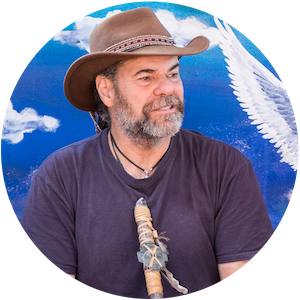 Richard Grossman studied Oriental Medicine at the California Acupuncture College in Los Angeles and received his post-graduate acupuncture training in Beijing, in a course sponsored by the World Health Organization and attended by physicians from around the world. He earned a Masters in Acupuncture, a Doctor of Oriental Medicine degree, a Ph.D. in Oriental Medicine, a Diplomat in Acupuncture, a Diplomat of Pain Management, and a Diplomat in Acupuncture Orthopedics.
Richard Grossman studied Oriental Medicine at the California Acupuncture College in Los Angeles and received his post-graduate acupuncture training in Beijing, in a course sponsored by the World Health Organization and attended by physicians from around the world. He earned a Masters in Acupuncture, a Doctor of Oriental Medicine degree, a Ph.D. in Oriental Medicine, a Diplomat in Acupuncture, a Diplomat of Pain Management, and a Diplomat in Acupuncture Orthopedics.

Show Notes
About Dr. Will Siu- He’s a psychiatrist and therapist on the MDMA for PTSD clinical trials with the supervision of Dr. Monnica Williams.
- Based in NYC and has a private practice.
- Does some work in emergency psychiatry at a local hospital.
- Associate professor at the University of Connecticut.
- Does graduate teaching and multicultural psychology and research in the health center.
- Currently doing a study on MDMA assisted psychotherapy for PTSD.
- What is race-based trauma?
- There had been some studies previously.
- When people become traumatized by experiences of racism, oppression, marginalization based on their perceived identity.
- Often because of ongoing experiences, like microaggressions
- Eventually, people have so many of these experiences that they start to have symptoms of PTSD.
- People get so distressed and afraid that they act in a way that might harm them.
- You have to think about trauma in a non-single event way.
- Exploring the topic epigenetics.
- Trauma has been passed down from generation to generation.
- Layer epigenetics on top of what’s currently going on and trauma is understandable.
- How has recruiting been going for the MDMA study?
- It’s challenging, they’re not drawing from the same population the other sites are.
- They’re creating a culturally safe, welcoming environment for people of color.
- There is fear and misinformation that requires them to do a lot of education on the front end.
- Research abuses haven’t stopped, they’re still continuing today.
- Psychedelic drugs are almost exclusively used by white people.
- Are there any big problems you’re trying to tackle now in prepping the study?
- Traditionally there has been no compensation for study participants, but it’s needed for this study.
- Another layer is paying via direct deposit vs. cash and getting the university on board.
- How do you send someone back into the trauma you’re trying to heal.
- How do you support people in the study?
- Support them as much as possible during the study.
- Continue to follow-up with people after the treatment is over.
- There is a lack of people of color in the therapy field, especially MAPS.
- Often people of color don’t have a good experience with white therapists.
- Why do you think there aren’t very many people of color in psychedelics?
- People of color haven’t had the same advantages to become therapists.
- It’s not safe to talk about substances when your license is on the line.
- Culturally, psychedelics haven’t played as big of a role with people of color.
- People of color haven’t had the same advantages to become therapists.
- What does an ideal training model look like for you?
- Watching the videos of people getting well was a big game changer.
- The training needs a fuller understanding of what people from other ethnic and cultural groups need.
- Monica is altering the training to be more relatable.
- Talk about enrollment.
- They have people at all different stages right now.
- They have about 18 people total who have gone through the stages.
- They still have to follow the guidelines of an indexed trauma to be accepted.
- How big is your team right now?
- Three therapist pair teams.
- A few other people who assist in various ways.
- Several people are doing double-duty.
- How can the psychedelic community be more inclusive of people of color?
- Make some close friends who are not white.
- Do you have any fantasy projects you’d like to see play out?
- Start a master’s program with a specialty track in minority mental health and psychedelic therapy.
- All scholarships for people of color.
- Any advice you’d give to a young person or professional?
- There’s a lot of work to be done and we need enthusiastic minds.
- Change won’t happen overnight or be easy, but it’s worth it.
- Be involved in the community
Episode Quotes
The psychedelic community is a very, very white community - most people of color haven’t had an experience with psychedelics. Ultimately, psychedelics and psychotherapy will be an accepted, licensed form of treatment.
About Monnica Williams
 Monnica Williams, Ph.D. is a board-certified, licensed clinical psychologist, specializing in cognitive-behavioral therapies. She is an Associate Professor in the Department of Psychological Sciences at the University of Connecticut, and Director of the Laboratory for Culture and Mental Health Disparities. She is also the Clinical Director of the Behavioral Wellness Clinic, LLC in Mansfield, Connecticut, and she has founded clinics in Kentucky, Virginia, and Pennsylvania.
Monnica Williams, Ph.D. is a board-certified, licensed clinical psychologist, specializing in cognitive-behavioral therapies. She is an Associate Professor in the Department of Psychological Sciences at the University of Connecticut, and Director of the Laboratory for Culture and Mental Health Disparities. She is also the Clinical Director of the Behavioral Wellness Clinic, LLC in Mansfield, Connecticut, and she has founded clinics in Kentucky, Virginia, and Pennsylvania. Will Siu, MD, DPhil
- Measuring wisdom
- Mindfulness
- The promise of psychedelics
- Future research opportunities
- How friendly the University of Toronto is to psychedelic research
- Interesting philosophical overlaps with psychedelics and occultism
- and much more!!
Quotes
We’re very much detached from our own traditions here in the west. Just imagining practicing something can have just as much of an effect of your performance than actually practicing it. You have to bring your insights back into the community to be an effective member of society. There’s a strong relationship between wisdom and psychedelics. Without intervention, life will tend toward suffering.
Links - Daniel Grieg
Youtube - Daniel Grieg Academia.edu Relevance realizing https://www.frontiersin.org/articles/10.3389/fphar.2017.00814/full https://www.frontiersin.org/articles/10.3389/fphar.2018.00100/full Wisdom - https://www.psychologytoday.com/us/basics/wisdom https://www.academia.edu/1762150/A_route_to_well-being_intelligence_vs._wise_reasoning http://journals.sagepub.com/doi/abs/10.1177/1948550616652206 http://www.wisdompage.com/Ardelt01.html Development Lines - Ken Wilbur Wiki Marta Kaczmarczyk
Marta Kaczmarczyk Paper: Mental Imagery: Functional Mechanisms and Clinical Applications
https://www.youtube.com/watch?v=HmGNhDUe19M&t=7319sDownload In this 94th episode of Psychedelics Today, host Joe Moore interviews Dr. Benjamin Malcolm, professor of pharmacy at the Western University School of Pharmacy. The discussion revolves around ibogaine, alkaloids, and addiction therapy solutions. Show Notes:
- Dr. Benjamin Malcolm discusses psychedelic alkaloids that have potential to treat
addictions.
- When conducting human subjects research, it’s a good idea to at least
run it past an IRB.
- There are risks involved in taking in ibogaine that can be used to treat addiction.
- For people age 18-24, opiates are a major cause of death.
- Holistic House teaches addicts heath habits for treatment.
- Ibogaine is still an unregulated area.
- 2CB haven’t had that many research studies.
- Surveys tend to have a bit of bias, often given to supportive subjects to begin with.
- Mescaline, San Pedro, and peyote appears to lack research.
- There is going to be a need to potentially or switch between traditional therapeutic
modalities and psychedelic-assisted psychotherapies.
In this episode of Psychedelics Today, host Kyle Buller interviews Alyssa Gursky, a Masters student at Naropa University with a focus in mental health counseling and transpersonal art therapy. Their discussion dives into the intersection between art therapy, transpersonal art, and psychedelics. Ketamine, symbols, and meaning are also areas of this interview.
3 Key Points:
- Alyssa Gursky has been working with the MDMA research In Boulder, Colorado and now in Fort Collins for the last three years as a night attendant.
- Creating art is a gift from our unconscious, to be able to see what is happening within ourselves.
- There is art in therapy and there is art as therapy.
More at: www.psychedelicstoday.com
Navigating Psychedelics: psychedelicstoday.teachable.com/p/navigatingpsychedelics
Introduction
In this episode of Psychedelics Today, host Joe Moore and Kyle Buller interview Matt Pallamary, and have a discussion with him about his writing, research, and ayahuasca experiences. He also shares his concerns about self-proclaimed gurus and some issues that have been emerging because of the popularity of ayahuasca. 3 Key Points:- Science fiction writer Ray Bradbury was a mentor of Matt Pallamary.
- There are pros and cons to ayahuasca shamanism in Peru.
- The more in touch with the natural world you are the more balanced you are.

Show Notes
- Matt Pallamary was part of the early psychedelics podcast scene.
- Matt grew up in Dorchester near Boston, and he began early experiences with sniffing glue, weed, and getting acid from a chemist from M.I.T..
- He has almost 20 years experience with ayahuasca.
- Too many people have a couple of ayahuasca experiences and claim to be a guru.
- Famed science fiction writer Ray Bradbury was a mentor of Matt Pallamary.
- Everything is energy—the whole universe exists between our eyes.
- Matt labels shamans as the first storytellers, the first musicians, the first performers, psychologists, psychiatrists, and first performers.
- Being in touch with the natural world makes a person more balanced.
- The boundaries between your conscious and subconscious are blurred, overlapping your visions, dreams, and waking life.
- When going through an ayahuasca experience, you have to be in a safe place where you can be vulnerable and around people you can trust.
- For ayahuasca experiences, be sure to get references from people that have successfully worked with a group.
Resources Mentioned:
- Matt Pallamary – Website for Matt Pallamary
About Author
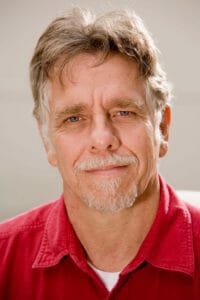 Author, Editor, and Shamanic Explorer Matthew J. Pallamary is an award winning writer, musician, and sound healer who has been studying shamanism all of his life. He incorporates shamanic practices into his daily life as well as into his writing and teaching. He has over a dozen books in print that cover several genres, many of which have been translated into foreign languages. His book on writing, Phantastic Fiction: A Shamanic Approach to Story took First Place in the International Book Awards Writing and Editing Category, and his popular Phantastic Fiction Workshop has been a staple of the Santa Barbara Writers Conference and the Southern California Writer’s Conference for over twenty five years. He has also lectured about writing and shamanism at numerous venues throughout the United States. Matt has spent extended time in the jungles, mountains, and deserts of North, Central, and South America pursuing his studies of shamanism and ancient cultures. Through his research into both the written word and the ancient beliefs of shamanism, he has uncovered the heart of what a story really is and integrated it into core dramatic concepts that also have their basis in shamanism.
Author, Editor, and Shamanic Explorer Matthew J. Pallamary is an award winning writer, musician, and sound healer who has been studying shamanism all of his life. He incorporates shamanic practices into his daily life as well as into his writing and teaching. He has over a dozen books in print that cover several genres, many of which have been translated into foreign languages. His book on writing, Phantastic Fiction: A Shamanic Approach to Story took First Place in the International Book Awards Writing and Editing Category, and his popular Phantastic Fiction Workshop has been a staple of the Santa Barbara Writers Conference and the Southern California Writer’s Conference for over twenty five years. He has also lectured about writing and shamanism at numerous venues throughout the United States. Matt has spent extended time in the jungles, mountains, and deserts of North, Central, and South America pursuing his studies of shamanism and ancient cultures. Through his research into both the written word and the ancient beliefs of shamanism, he has uncovered the heart of what a story really is and integrated it into core dramatic concepts that also have their basis in shamanism.
Caution!!
A few important notes. This is an episode of an individual experimenting with powerful drugs to see if he can get any sort of relief from autism. In this case, it appears to have been successful. That said, this came with a substantial amount of risks, and people need to be aware. Please read the below bullets so you understand.- Autism is not what is treated. The thing being treated would be a symptom like social anxiety.
- "The field of autism science includes a long and shameful history of quack treatments and parents taking desperate and harmful measures to “fix” their children. Autism is a spectrum of congenital and neurocognitive variants, and there are no published research data in support of any compound that can influence its course." Alicia Danforth, PhD
- Please do not administer these drugs to children with autism.
- There are only two researchers investigating where MDMA and autism meet - Alicia Danforth PhD and Dr. Charlie Grob. A scientific paper will likely be available on this in the next few months. Expect to see more here.
- These drugs have not been shown to cure or treat autism, but in some cases, just like with neuro-typical individuals, some have seen meaningful changes.
- Even if changes are noticed the person is still autistic no matter how many high doses of psychedelics they take.
- Obtaining pure drugs is very difficult if not impossible in black markets.
- Verifying purity will require the resources of mass spectrometry from organizations offering these services like Energy Control or Ecstasy Data
- Providing unsafe, dirty or compromised drugs to people can cause serious harm or death.
- If you are planning to use MDMA to alleviate some suffering on your own, please wait or don't.
- Do substantial research and have skilled people available to help.
..autism is a genetically determined cognitive variant. It's pervasive, and it affects the whole person, not just the brain. No chemical compound has been shown to treat, cure, or alter the course of autism. However, for some people, substances like MDMA can help them manage symptoms such as anxiety, social anxiety, and trauma effects. - Alicia Danforth, Ph.D
Introduction
Joe Moore and Kyle Buller interview Jon and Dre of the Voices in the Dark podcast out of England. The discussion addresses treating autism with MDMA and LSD, what types of doses you should take, and how to in part do it safely. Note there are always risks with any kind of drug. Learn the basics over at our Navigating Psychedelics course. 3 Key Points:- A lot of autism is sensory overload. As far as emotions are concerned, we see potentially too many things in other people’s faces.
- A good range for MDMA dosages is between 100mg and not going over 200mg.
- 125 micrograms per drop of liquid LSD, and not going above 250 micrograms is recommended.

Show Notes
-
-
- Jon’s first psychedelic experience shifted his academic career path and helped him to deal with depression.
- Dre first tried MDMA as a first step and it unlocked emotional empathy.
- Sensory overload is a lot of Autism according to Dre.
- Jon’s experiences with MDMA made him feel like himself without the fear and the worry.
- MDMA and LSD at the same time didn’t feel as emotional when combined to Jon.
- 125 micrograms per drop of liquid LSD, and not going above 250 micrograms is recommended.
- Democratising psychedelic therapy is where Joe would like to see the industry go.
- Jon is against the fetishizing of any particular concept of belief system in its totality.
- Jon is excited that he is starting to see more types of research on LSD/MDMA and autism.
- Dre’s experiences have shifted his autism by feeling that he has a foot in both worlds to know how living without it feels in his mind.
-
-
- Voices in the Dark – Website for Voices in the Dark
- Instagram – Psychedelics Today Instagram
- Patreon – Psychedelics Today Patreon donation page
- DMTX.org – Website for DMTX.org
- Ecstasy Could Help Adults With Autism Cope with Social Anxiety - Discover Magazine
- MDMA-Autism - MAPS.org
- MDMA-assisted therapy: A new treatment model for social anxiety in autistic adults
- Autism and LSD-25
About Voices in the Dark
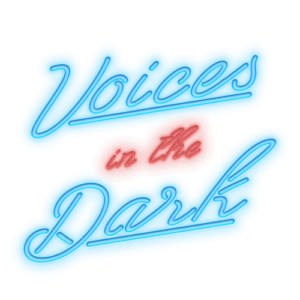 LEARNING HOW TO HUMAN
LEARNING HOW TO HUMAN
At Voices in the Dark, we bring you powerful, mind- and soul-expanding conversations about real life psychology, philosophy, psychedelics, spirituality, social dynamics and much more. We’re a podcast, a blog, and a community of likeminded individuals who want to become the best versions of themselves. We’re dedicated to never stop Learning How To Human. Our mission is to entertain, provoke, inform, and make you question everything you think you know. DRE
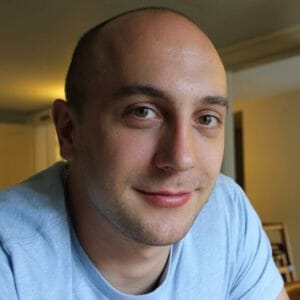 A disturbingly quick study in most fields, Dre’s autism made learning people more of a challenge. The works of Robert Greene shone a light on the otherwise deeply confusing world of other people’s psyches, transforming the world around him into something which finally made sense.
A disturbingly quick study in most fields, Dre’s autism made learning people more of a challenge. The works of Robert Greene shone a light on the otherwise deeply confusing world of other people’s psyches, transforming the world around him into something which finally made sense. JON
Download
Kyle and Joe discuss professionalism in the psychedelic field. There are a number of people out there doing very unprofessional things. We need to be aware of what professionalism could look like, what self care, ethics and boundaries look like in this world we are actively developing.
In light of festival season, we are offering a $30 off coupon for our online store with every purchase of our course, Navigating Psychedelics: Lessons on Self-Care and Integration throughout the month of June. If you are a student, please email us with your university email address to receive a special discount!
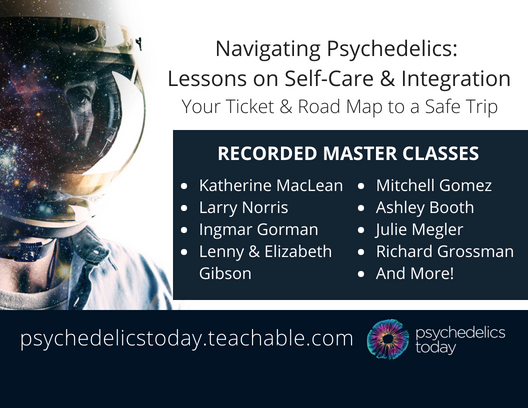 Joe and Kyle will also be offering some special live online course options. If you want to stay up-to-date about these offerings, sign up for our email list.
Joe and Kyle will also be offering some special live online course options. If you want to stay up-to-date about these offerings, sign up for our email list. If you're interested in learning more about DMTx, you can enroll in the DMTx 4-week Psychonaut Training. Proceeds go towards the DMTx project.
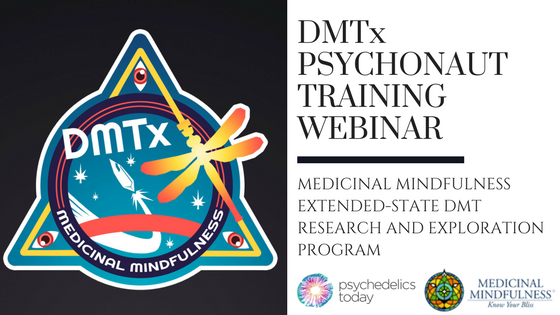
Quotes
We have to be OK with the fact that as we get confronted by the internalized racism and patriarchy and privilege that our psychedelic sub-culture carries, that its going
to be a little messy for a while, and we are all going to have to feel uncomfortable at times.
Giving up your privilege is the ultimate psychedelic trip. There is something about that surrender that’s really deep.
If you are someone who does what we call holding space or facilitates in someway, to actively hand that power back as often as possible, when you realize someone is trying to give it to you it, is a really powerful meditation.”
 https://www.youtube.com/watch?v=nmzDUK-EZqQ
https://www.youtube.com/watch?v=nmzDUK-EZqQ Show Notes
● Britta Love talks about sexual abuse stories that were discussed on a panel on psychedelic patriarchy she participated in. ● In Britta’s anti-racist work, whenever she starts to feel uncomfortable, she recognizes that that discomfort is not as bad as what it must feel like to get oppressed by systemic racism. ● Author Robert Anton Wilson’s idea of “reality tunnels” is that we all have our B.S. (Belief System). What if we could flip between belief systems and be more flexible and be more literate with reality and open-minded. ● Britta speaks about a healer who was sexually abusive to a woman she knows. ● A woman was raped by a male nurse and she was strong-armed to sign a non-disclosure agreement. ● The psychedelic community needs more diversity, more women and people of color to balance out the equality of voices. ● We need healthy models of sexuality to express sexual energy in a positive and constructive manner to get rid of sexual aggression and power dynamics. ● We are too willing to hand over our power to healers and shamans. We can become our own healers when we are in safe environments. ● Psychedelic therapy can be demystified and taught, and doesn’t have to remain esoteric with a hierarchy of privilege structures. ● Forming collectives of up to 100 people with different skills to form a safe, supportive, and collective village of awareness and wisdom. ● How do we create containers that are encouraging of and supportive of the deep reflection that is required to undo racism and patriarchy and systems of oppression require? 3 Key Points: 1. In Britta’s anti-racist work, whenever she starts to feel uncomfortable, she recognizes that that discomfort is not as bad as what it must feel like to get oppressed by systemic racism. 2. We are too willing to hand over our power to healers and shamans—we can become our own healers when we are in safe spaces. 3. Know your value and contribution within a group. People feel better when they are a giver.Resources Mentioned
Instagram - BrittaLoved The Daily TransmissionLinks
10 Reasons to End the War on Drugs and the War on Sex WorkersBritta Love
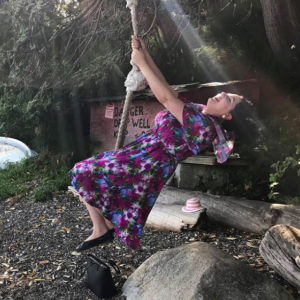 Britta Love is a writer, somatic sex educator and multi-dimensional healer based in Brooklyn, NY. A graduate of the London School of Economics and Goddard College, she wrote her thesis in Consciousness Studies on the healing and spiritual potential of altered states, specifically those induced by conscious sexual practice and the ritual use of psychoactive plant medicines. She writes for Alternet, Psymposia and Reality Sandwich, gives talks and facilitates workshops in NYC, and blogs on sex, drugs and consciousness
Britta Love is a writer, somatic sex educator and multi-dimensional healer based in Brooklyn, NY. A graduate of the London School of Economics and Goddard College, she wrote her thesis in Consciousness Studies on the healing and spiritual potential of altered states, specifically those induced by conscious sexual practice and the ritual use of psychoactive plant medicines. She writes for Alternet, Psymposia and Reality Sandwich, gives talks and facilitates workshops in NYC, and blogs on sex, drugs and consciousness

Show Notes
-
- What is DMTx
- Who originated the concept.
- Dr Rick Strassman and Dr Andrew Gallimore.
- Daniel's story of a very intense and meaningful DMT experience
- Much more!
Resources Mentioned
Daniel McQueen, MA
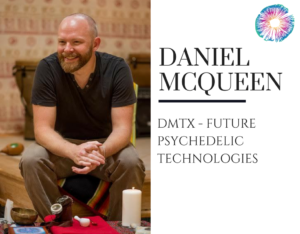 Daniel discovered meditation and spiritual practices at twelve and has been interested in exploring inner states ever since. He apprenticed under a number of shamanic teachers and has been a practicing intentional journeyer for over 16 years. For Daniel, working in the professional field of Cannabis and Psychedelics isn’t a career interest, but represents a core identity and life calling. Finding a place to honor such a life calling within a world that has until recently prohibited it has been an interesting challenge. After graduating from the University of Arkansas with a degree in Communication, Daniel traveled down a many forked and unmarked road through the wild terrain of political activism, corporate accountability research and campaign finance reform for many years in Washington, DC. Disillusioned by the city, he moved to Florida and opened a small meditation center to explore grassroots community organizing before moving to Boulder, CO and returning to school at Naropa University. Daniel earned a Masters Degree in Transpersonal Counseling Psychology from Naropa and received advanced training in MDMA-assisted psychotherapy through a year internship with the MAPS Boulder MDMA for PTSD Study. It was his experience with MAPS that inspired Daniel to explore alternative visions in cannabis and psychedelic activism and entrepreneurship. Daniel bridges transpersonal paradigms with the grounded clinical and organizational skills necessary to begin addressing the significant ecological and mental health crises facing our society today. Although Daniel no longer practices as a clinical psychotherapist, he supports his clients as a teacher, coach, ally and event facilitator, providing individual and group transformational experiences and deeply held intentional conversations. In his practice, Daniel quickly realized that the most important intervention he could provide to his clients, who were isolated and longed for meaningful contact with others, was a sense of community. Medicinal Mindfulness is, in a very real way, a cultural intervention that provides a safe and transformational community container for healing and awakening... a program based on skill development and not dogma. Since 2012, Daniel has been teaching a psychedelic harm prevention and intentional psychedelic use course called Psychedelic Sitters School. Since the legalization of recreational cannabis in Colorado, he has been facilitating group journey experiences called Conscious Cannabis Events and guiding individual cannabis journeys. In addition to his work with Medicinal Mindfulness, Daniel has a successful spirituality and life coaching practice with his wife, Alison, through their company, Aspenroots Counseling LLC. Highly skilled in identifying and cultivating giftedness in young people and supporting significant life transitions, Daniel is inspired to support passionate and talented individuals striving to live into their calling. A primary focus of his practice involves assessing and addressing the benefits and difficulties related to psychedelic and cannabis use and misuse. Daniel co-founded the Naropa Alliance for Psychedelic Studies and helped organize the first annual Psychedelic Symposium at Naropa University in 2012.
Daniel discovered meditation and spiritual practices at twelve and has been interested in exploring inner states ever since. He apprenticed under a number of shamanic teachers and has been a practicing intentional journeyer for over 16 years. For Daniel, working in the professional field of Cannabis and Psychedelics isn’t a career interest, but represents a core identity and life calling. Finding a place to honor such a life calling within a world that has until recently prohibited it has been an interesting challenge. After graduating from the University of Arkansas with a degree in Communication, Daniel traveled down a many forked and unmarked road through the wild terrain of political activism, corporate accountability research and campaign finance reform for many years in Washington, DC. Disillusioned by the city, he moved to Florida and opened a small meditation center to explore grassroots community organizing before moving to Boulder, CO and returning to school at Naropa University. Daniel earned a Masters Degree in Transpersonal Counseling Psychology from Naropa and received advanced training in MDMA-assisted psychotherapy through a year internship with the MAPS Boulder MDMA for PTSD Study. It was his experience with MAPS that inspired Daniel to explore alternative visions in cannabis and psychedelic activism and entrepreneurship. Daniel bridges transpersonal paradigms with the grounded clinical and organizational skills necessary to begin addressing the significant ecological and mental health crises facing our society today. Although Daniel no longer practices as a clinical psychotherapist, he supports his clients as a teacher, coach, ally and event facilitator, providing individual and group transformational experiences and deeply held intentional conversations. In his practice, Daniel quickly realized that the most important intervention he could provide to his clients, who were isolated and longed for meaningful contact with others, was a sense of community. Medicinal Mindfulness is, in a very real way, a cultural intervention that provides a safe and transformational community container for healing and awakening... a program based on skill development and not dogma. Since 2012, Daniel has been teaching a psychedelic harm prevention and intentional psychedelic use course called Psychedelic Sitters School. Since the legalization of recreational cannabis in Colorado, he has been facilitating group journey experiences called Conscious Cannabis Events and guiding individual cannabis journeys. In addition to his work with Medicinal Mindfulness, Daniel has a successful spirituality and life coaching practice with his wife, Alison, through their company, Aspenroots Counseling LLC. Highly skilled in identifying and cultivating giftedness in young people and supporting significant life transitions, Daniel is inspired to support passionate and talented individuals striving to live into their calling. A primary focus of his practice involves assessing and addressing the benefits and difficulties related to psychedelic and cannabis use and misuse. Daniel co-founded the Naropa Alliance for Psychedelic Studies and helped organize the first annual Psychedelic Symposium at Naropa University in 2012. About Medicinal Mindfulness
- Banks are devaluing currency by charging high fees.
- With block chain, you’ve got to think in the long-term.
- There’s so much going on with crypto, you can’t keep up.
- What blockchain developer wants to go work for Facebook?

Show Notes
- Joe and Brian discuss the CryptoPsychedelic Conference the took place in Tulum, Mexico.
- What is blockchain?
- A next-gen decentralized ledger.
- A peer-to-peer border-less, institution-less payment system.
- Money will be one of the first users of blockchain.
- Banks are devaluing currency by charging high fees.
- The whole concept of money will transform, it will be a border-less thing.
- When Napster came out, peer to peer transfer became a very popular technology.
- When the record companies worried about being irrelevant, they sued.
- There could be something like Spotify that pays artists more fairly than Spotify currently does.
- Social media could be rebuilt.
- We could no longer be the product being sold, but get paid for our contributions.
- Could crypto be used to trace the history and purity of substances?
- Yes, that’s a definite use case.
- The first voting on a block chain happened in Sierra Leone.
- You’ve got to think in the long term.
- What were some of the more interesting things that came out of the CryptoPsychedelic conference?
- Some of the new relationships and seeing the potential collaboration between the two communities.
- Projects in this space need to be taken on.
- It was a time to question, not really a time for answers.
- Watch the movie 2001 a Space Odyssey in one sitting.
- Every time you watch it you come away with a new experience.
- Cryptocurrencies are border-less, some have minimal fees, and it’s instant.
- Decentralized systems
- Information is easier to access, it doesn’t have to climb up a ladder.
- The DAO is the Decentralized Autonomous Organization – there is no hierarchy.
- Government could eventually be run via blockchain.
- How could we use the internet to further the message of psychedelics?
- Before the internet, the only way you were exposed to information was top down.
- Networks, authority institutions.
- Because of the internet, information is moving more horizontally.
- How do you change incentive structures in the drug war? Could it be these new technologies?
- Before the internet, the only way you were exposed to information was top down.
- The rate of innovation now is way faster than it was when the internet was first coming out.
- You cannot keep up with what’s going on, there’s too much going on.
- Look at money as a tool or form of energy.
- Crypto will change everyone’s concept of paying taxes.
- Air BnB cut the cities completely out of the picture.
- Taxes and healthcare or both extremely important and impossible for people to understand.
- Internet privacy is a big deal in crypto and psychedelics alike.
- Brian doesn’t think that Facebook will ultimately make it.
- Developers want to build new tools to take down the giants like Facebook.
- Recently, Facebook announced a decline in users.
- What can you do to reverse becoming “uncool”?
- Reddit’s price per impression is much lower.
- Steemit has a fascinating model.
- It would be cool if you could be compensated for putting helpful content online.
- We assume that the way the internet is now is how it’s always going to be.
- How can we use the tool to help the people whose lives aren’t privileged like ours?
- In a lot of refugee camps, you can’t have cash, so crypto is huge for them.
- What happens when people who are impoverished around the world can now crowdfund?
Resources Mentioned
Brian Normand Viveros 
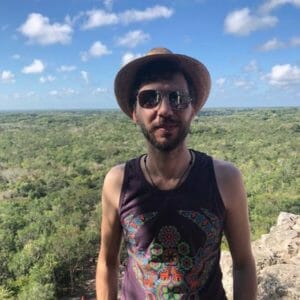 Brian Normand is CoFounder of Psymposia, entrepreneur, and advocate of psychedelic science, therapy, and drug reform. He attended the University of Massachusetts Amherst and holds a B.S. in Plant, Soil, and Insect Science, Magna Cum Laude.
Brian Normand is CoFounder of Psymposia, entrepreneur, and advocate of psychedelic science, therapy, and drug reform. He attended the University of Massachusetts Amherst and holds a B.S. in Plant, Soil, and Insect Science, Magna Cum Laude.
Introduction
During this episode of Psychedelics Today, your hosts Kyle Buller and Joe Moore talk to Zach Leary host of the MAPS podcast and It’s All Happening. We have an incredible time talking to Zach and his worldview, experiences, opinions and much more. It was a very fun time recording with Zach and we hope it can happen again in the near future.
Show Notes
- Joe and Kyle discuss Zach’s connections with Ram Dass
- Zach Leary calls himself a futurist and we discuss what a futurist is.
- A natural way to continue the narrative of our physical evolution and our spiritual development.
- Cyberspace is an invention as a result of our human condition.
- The way and the reason we invented it is that we found a need to create another dimension.
- Futurism and transhumanism and embracing the way technology is augmenting the human experience is a great place to be.
- Do you see any major problems in psychedelia?
- Overall, it’s a great time to be into psychedelics.
- There’s so much research and data available to the end-user and the discussion is improving.
- Many people are starting to be more open about their beneficial relationship with psychedelics.
- It’s important to get people in the mainstream aware of their beneficial properties.
- The Ayahuasca fad going on in the U.S. has many people calling themselves shamans, which raised a red flag to Zach.
- It used to be that going to the medicine man was a common occurrence in any culture.
- Mysticism didn’t go away, it just got turned into a more doctrinal practice.
- Overall, it’s a great time to be into psychedelics.
- The part of the church that bothers Zach is the authoritarian aspect, that there is only one god.
- There’s an element of fanaticism when someone says there’s only one drug that’s worth taking.
- April 19 is the 75th anniversary of the first intentional use of LSD (Bicycle Day).
- We have to start re-thinking about what “natural” means.
- The human imagination and what it creates is a by-product of nature.
- There’s no stopping the technological march, the train has left the station.
- A return to nature can include biodiverse rooftop gardens in New York.
- It’s very hard to get off the grid.
- What do we have that’s readily available and sustainable?
- Mushrooms
- LSD
- Other synthetic compounds that don’t bother the rainforest, etc.
- Drugs that may not be sustainable:
- Ayahuasca, Peyote, 5-MeO (Sonoran Desert Toad - Bufo Alvarius toad venom)
- Some people are playing fast and loose with 5-MeO
- There are people who give do things to “patients” that are non-consensual while they are under the effect of the drug.
- Psychedelics are often highly individualistic.
- It’s nice to be able to jump in with a shaman, but to what extent?
- There is some cultural appropriation here when you take ancient practices and move them into new environments.
- It’s best not to ignore the roots and traditions of these practices but honor them as best as you can.
- How do we not make mistakes in psychedelics?
- There’s so much data, examples and role models now.
- There are best practices based on data now.
- Zach would like to see less consumption of MDMA.
- People over-consume MDMA.
- More of a concern about bodily harm.
- 2-3 times a year is probably enough.
- There are parallel paths going on and if the parallel path of computers and humanity are going on, what does that look like eventually?
- What are some of your major influences in the psychedelic world?
- Terence McKenna, Jim Fadiman, Timothy Leary, Aldous Huxley, Dennis McKenna
- How would you like to see the future of psychedelics evolve?
- We’re seeing the rumblings of what’s to come.
- There’s going to be a firmly legitimate place in the psychiatric world for the psychedelic therapy.
- Hopefully, it carries over into recreational use and cognitive therapy.
Links
About Zach Leary
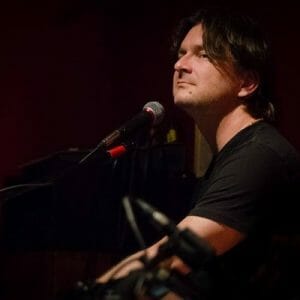
Zach is the host of both the “It’s All Happening with Zach Leary” podcast and “The MAPS Podcast.” They have helped to cement him as one of the most thought provoking podcasters in the cultural philosophy genre of podcasting. He’s also a blogger/writer, a futurist, spiritualist, a technology consultant and socio-cultural theorist.
In all of Zach’s work he blends his roles as a spiritual aspirant and a futurist into a unique identity all his own. His spiritual background has it’s roots in being a practitioner of bhakti yoga as taught through many of the vedantic systems of Northern India, in particular Neem Karoli Baba as taught by Ram Dass. Through the practice of bhakti yoga he has found keys that unlock doorways that allow the soul to experience it’s true nature of being eternal, full of knowledge and full of bliss. In addition to bhakti yoga, Zach is influenced by many different methods and traditions of consciousness exploration ranging from trans-humanism to buddhism and clinical psychology. Zach is also a frequent pundit on the political systems that are fueling todays economic and cultural structures. At the core of all of Zach’s work is the belief that we have been fused together by the collective practice of using technology to expand our species imagination with spirituality and mysticism to define the very nature of who we are.
Check out our online store
/**/
/**/
/**/
Download
During this episode of Psychedelics Today, your hosts Kyle and Joe Moore talk to Dr. Matt Segall, a philosopher with a Ph.D. working at CIIS as an administrator and adjunct lecturer. In this episode, we explore psychedelics through the lens of philosophy and Alfred North Whitehead.
Show Notes:
- Philosophy is really important when talking about psychedelics.
- This movement is working on a lot of different levels.
- Looking to get accepted into academia therefore it’s important to be precise.
- About Dr. Matt Segall
- Strong interest in Alfred North Whitehead
- 12 levels of abstraction away from Plato.
- Ropes in all of western philosophy and science into a cohesive system that seems to reenchant the world a bit.
- Extended state DMT research
- Use an IV pump to keep a steady stream of DMT in the bloodstream for an undetermined amount of time.
- The initial phase of the study is 10-20 minutes.
- Not just for medical research, it’s for the community.
- Join the class at psychedelicstoday.teachable.com.
- How did Matt Segall stumble his way into the Whitehead world?
- Philosophy came first, but not by much.
- He had a teacher who introduced him to some psychedelic teachers.
- His first experience with psychedelics was when he was 19 years old with mushrooms.
- He realized that there were many other worlds running in parallel with this one.
- These substances open up our perceptions of other worlds and other facets of the same world.
- We need to incorporate the experience induces by these substances.
- Western philosophy is rooted in the psychedelic experience.
- Plato’s encounter with the ideal forms that led him out of the cave proves that the origins of philosophy include psychedelics.
- There is chemical evidence that the rituals in Athens were psychedelic in nature.
- When ancient Greeks refer to wine, they’re talking about something that was way more mind altering.
- What drew you into Whitehead?
- In college, he listened to a McKenna lecture and he mentioned Whitehead a lot.
- McKenna introduced him to Whitehead.
- He waited until he started graduate school, so he could take a course on him and study him alongside other graduate students.
- Whitehead incorporated 20th century physics and a version of Darwin’s understanding of evolution expanded to a cosmological level.
- Combining advanced science with an enchanted view of the universe.
- The modern era has alienated human beings from the rest of the natural world.
- The industrial revolution made this alienation even more profound.
- There has been a gradual isolation of the human being from the rest of life and the universe.
- Human beings have come to think of the rest of life and just robots seeking to reproduce.
- Value has to be assigned to anything non-human by humans.
- This thinking is highly destructive.
- Our idea has not fit the reality and it’s destroying the reality.
- Whitehead helps us re-inhabit the planet as one of the many species.
- When human beings come to recognize that value is not just made up in our human society but it’s an intrinsic cosmic value, they can act accordingly.
- Whitehead’s process is called a process-relational process.
- We’ve traditionally been thought to have a soul or mind that’s independent of others.
- Whitehead proposes that our soul or mind is in relation to others.
- So that what it means to be me is that I’m not unique, but my uniqueness comes from my unique perspective and works with the other souls in the environment.
- This attempts to move us away from thinking of ourselves as isolated minds.
- The biggest challenge is to get people to not shut down when they see Whitehead’s terminology.
- Philosophy can serve to help us develop a language that actually serves to represent our experience.
- It’s well worth it to learn the dictionary that Whitehead provides.
- Whitehead’s understanding of perception is welcoming more indigenous ways of knowing back into the realm of philosophy.
- Whitehead helps us make sense of indigenous experience.
- All of human culture stems from these shamanistic practices.
- We don’t yet have the words to explain yet what these psychedelic journeys are doing to us.
- A downside to being in the west is that we don’t have relationship with psychedelic substances.
- The plants that are a part of the ayahuasca brew told the indigenous people how to brew them.
- People talk about nature deficit disorder, kids being raised indoors being told the outdoors is dirty.
- The problem is not one of trying to reinvent the wheel, we have to stop beating this capacity out of children.
- When we talk about the human nervous system in the context of symbiotic relationships with our ecosystem:
- It doesn’t make sense to consider the human brain and nervous system as enclosed within the skull.
- The human nervous system is actually a lot more ecological in its extent than most physiologists would let on.
- The chemical metabolism of our brain extends out into the environment.
- Richard Doyle wrote a book called Darwin’s Pharmacy where he coins the term “ecodelic” which challenges the idea of an autonomous individual.
- The idea is we’re actually permeated by the chemicals flowing through our environment.
- Our consciousness is shaped any time we eat anything.
- Some drugs are not thought of as drugs: sugar, caffeine, tobacco.
- These are accepted psychedelic substances.
- The fact that cannabis and other psychedelics are becoming more mainstream again shows that we in late-stage capitalism.
- Is there anything in particular you’ve been excited about in psychedelics lately?
- The research on MDMA for PTSD in veterans coming back from Iraq and the success rate they’re achieving.
- The FDA may be forced by the sheer weight of the evidence to approve MDMA.
- The hope is that we can use MDMA to treat “pre-traumatic stress disorder.”
- Enhance the empathic capacity of those who handle a great deal of conflict.
- Within a year or two the FDA is going to be approving MDMA, which is unbelievable.
- Joe and Matt talk about how credentials are often forced as a barrier to entry into certain fields.
- Matt is all for a standardized approach to mainstream these things.
- He wants to go in all directions to get the therapy out.
- The plants used in psychedelics are so much safer than any drug that’s on the market right now.
- Some lawmakers are trying to pass a law to allow the death penalty for drug dealers, including those who sell cannabis.
- Do you have any places you’d like to send people to re-engage with philosophy?
- Study the history of philosophy.
- Passion of the Western Mind by Richard Tarnas.
- Story of Philosophy by Will Durant
- Matt teaches an online course on Whitehead, the next one begins in January 2019.
- Philosophy is not an abstract linguistic analysis.
- He approaches philosophy as a spiritual practice.
- Philosophy is learning to die.
- We’re embodied creatures and philosophy is a way to come to terms with that.
- Psychedelics help you experience ego death, but we’re still conscious.
- In college, he listened to a McKenna lecture and he mentioned Whitehead a lot.
Tweetable Quotes
- Psychedelics are not just theoretically interesting, they have profound practical implications for how we organize our lives.
- Whitehead’s terminology is an attempt to return us to our concrete experience.
- Philosophy is learning to die.
Resources Mentioned
- Psychedelicstoday.teachable.com
- Bluebird Botanicals
- Footnotes2plato.com
- Pharmakon – book by Michael Rinella
- Passion of the Western Mind – book by Richard Tarnas
- Story of Philosophy – book by Will Durant
- Introduction to Process Relationship Philosophy – book by Robert Mesle
- 0thouartthat0 – Matt’s Youtube Channel
About Matthew Segall, Ph.D.
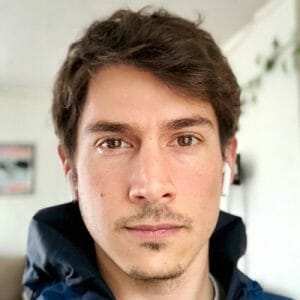
Matthew T. Segall, PhD, received his doctoral degree in 2016 from the Philosophy, Cosmology, and Consciousness program at CIIS. His dissertation was titled Cosmotheanthropic Imagination in the Post-Kantian Process Philosophy of Schelling and Whitehead. It grapples with the limits to knowledge of reality imposed by Kant's transcendental form of philosophy and argues that Schelling and Whitehead's process-oriented approach (described in his dissertation as a "descendental" form of philosophy) shows the way across the Kantian threshold to renewed experiential contact with reality. He teaches courses on German Idealism and process philosophy for the Philosophy, Cosmology, and Consciousness program at CIIS. He blogs regularly at footnotes2plato.com.
About Mark Plotkin, Ph.D
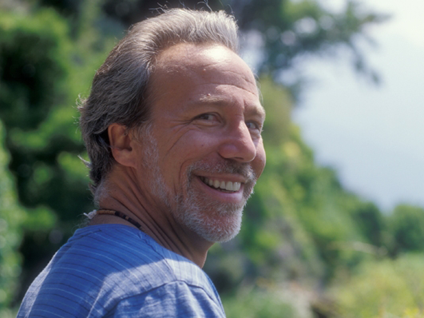 Dr. Plotkin has led ACT and guided its vision since 1996, when he co-founded the organization with his fellow conservationist, Liliana Madrigal. He is a renowned ethnobotanist who has spent almost three decades studying traditional plant use with traditional healers of tropical America. Dr. Plotkin has previously served as Research Associate in Ethnobotanical Conservation at the Botanical Museum of Harvard University; Director of Plant Conservation at the World Wildlife Fund; Vice President of Conservation International; and Research Associate at the Department of Botany of the Smithsonian Institution. Among his many influential writings, Dr. Plotkin may be best known for his popular work Tales of a Shaman's Apprentice (1994), which has been printed continuously and has been published in multiple languages. Other works include the critically acclaimed children's book The Shaman's Apprentice - A Tale of the Amazon Rainforest, illustrated by Lynne Cherry, and Medicine Quest: In Search of Nature's Healing Secrets. His most recent book, The Killers Within: The Deadly Rise of Drug-Resistant Bacteria, coauthored with Michael Shnayerson, was selected as a Discover Magazine book of the year. In 1998, he played a leading role in the Academy Award-nominated IMAX film Amazon. Dr. Plotkin's work also has been featured in a PBS Nova documentary, in an Emmy-winning Fox TV documentary, on the NBC Nightly News and Today Show, CBS' 48 Hours and in Life, Newsweek, Smithsonian, Elle, People, The New York Times, along with appearances on National Public Radio. Time magazine called him an "Environmental Hero for the Planet" (2001) and Smithsonian magazine hailed him as one of "35 Who Made a Difference" (2005), along with Bill Gates, Steven Spielberg, and fellow New Orleanian Wynton Marsalis. Dr. Plotkin has received the San Diego Zoo Gold Medal for Conservation; the Roy Chapman Andrews Distinguished Explorer Award; an International Conservation Leadership award from the Jane Goodall Institute; and, with Liliana Madrigal, the Skoll Foundation’s Award for Social Entrepreneurship. In 2010, he received the honorary degree of "Doctor of Humane Letters" from Lewis and Clark College in Portland, Oregon. Dr. Plotkin was educated at Harvard, Yale and Tufts University.
Dr. Plotkin has led ACT and guided its vision since 1996, when he co-founded the organization with his fellow conservationist, Liliana Madrigal. He is a renowned ethnobotanist who has spent almost three decades studying traditional plant use with traditional healers of tropical America. Dr. Plotkin has previously served as Research Associate in Ethnobotanical Conservation at the Botanical Museum of Harvard University; Director of Plant Conservation at the World Wildlife Fund; Vice President of Conservation International; and Research Associate at the Department of Botany of the Smithsonian Institution. Among his many influential writings, Dr. Plotkin may be best known for his popular work Tales of a Shaman's Apprentice (1994), which has been printed continuously and has been published in multiple languages. Other works include the critically acclaimed children's book The Shaman's Apprentice - A Tale of the Amazon Rainforest, illustrated by Lynne Cherry, and Medicine Quest: In Search of Nature's Healing Secrets. His most recent book, The Killers Within: The Deadly Rise of Drug-Resistant Bacteria, coauthored with Michael Shnayerson, was selected as a Discover Magazine book of the year. In 1998, he played a leading role in the Academy Award-nominated IMAX film Amazon. Dr. Plotkin's work also has been featured in a PBS Nova documentary, in an Emmy-winning Fox TV documentary, on the NBC Nightly News and Today Show, CBS' 48 Hours and in Life, Newsweek, Smithsonian, Elle, People, The New York Times, along with appearances on National Public Radio. Time magazine called him an "Environmental Hero for the Planet" (2001) and Smithsonian magazine hailed him as one of "35 Who Made a Difference" (2005), along with Bill Gates, Steven Spielberg, and fellow New Orleanian Wynton Marsalis. Dr. Plotkin has received the San Diego Zoo Gold Medal for Conservation; the Roy Chapman Andrews Distinguished Explorer Award; an International Conservation Leadership award from the Jane Goodall Institute; and, with Liliana Madrigal, the Skoll Foundation’s Award for Social Entrepreneurship. In 2010, he received the honorary degree of "Doctor of Humane Letters" from Lewis and Clark College in Portland, Oregon. Dr. Plotkin was educated at Harvard, Yale and Tufts University. About the Amazon Conservation Team
The Amazon Conservation Team (ACT) is a non-profit organization dedicated to preserving South American rainforests. This small but robust outfit occupies a unique niche among other environmental non-profits working in the tropics: ACT works hand in hand with local indigenous communities to devise and implement its conservation strategies.About Dennis McKenna
Dennis Jon McKenna is an American ethnopharmacologist, research pharmacognosist, lecturer and author. He is a founding board member and the director of ethnopharmacology at the Heffter Research Institute, a non-profit organization concerned with the investigation of the potential therapeutic uses of psychedelic medicines. McKenna received his Master's degree in botany at the University of Hawaii in 1979. He received his doctorate in botanical sciences in 1984 from the University of British Columbia,[2] where he wrote a dissertation entitled Monoamine oxidase inhibitors in Amazonian hallucinogenic plants: ethnobotanical, phytochemical, and pharmacological investigations. McKenna then received post-doctoral research fellowships in the Laboratory of Clinical Pharmacology, National Institute of Mental Health, and in the Department of Neurology, Stanford University School of Medicine.Dennis McKenna Links
Dennis on Facebook - https://www.facebook.com/dennisjonmckenna/ Dennis's Recent book - Brotherhood of the Screaming Abyss Symbio Life Sciences https://www.youtube.com/watch?v=oKiKfAmysrILinks
https://www.ted.com/talks/mark_plotkin_what_the_people_of_the_amazon_know_that_you_don_tMalin Vedøy Uthaug, a PhD candidate from Prague, joins Psychedelics Today to talk about her interest and research with ayahuasca and 5-MeO-DMT. Malin shares her experience how she got involved studying psychedelics and shares a little bit about her personal experiences with ayahuasca. Malin is currently working on an interesting research study examining the potential influence that the ritual and ceremony may have on the overall ayahuasca experience.
More at https://psychedelicstoday.com
[youtube https://www.youtube.com/watch?v=Y4-lJWwwRc8]
A brief introduction to Gnosis
Suppose you come to the end of your tether, can no longer cope, have a break-down, fall apart, go to pieces. To whom would you turn? Where would you go? What alternatives do you have when you desperately need help, but have little, if any, say in the kind of help available? When a person’s suffering becomes insupportable, to him or herself and to others, and yet persists, that person is in a state of distress. Once you find yourself in distress you come to realize that you are at the mercy of other people. Which of those people are you willing to be at their mercy, for better or worse? To whom are you willing to entrust your life? If you don’t happen to know anyone who comes to mind, then how will you go about finding someone you can trust? Do such persons exist? Gnosis Retreat Center aspires to be such a place, by providing a safe place to be, when you are alone and afraid, confused, bereft, and not sure whom to turn to for help. Gnosis is a household that is populated by others like yourself, a refuge for those who are lost, afraid, bewildered, or simply seeking a fresh start, who may, if they choose, get over their ordeal and see it through, without jeopardy.If you want to learn more about spiritual emergence(y) check out this online webinar: Spiritual Emergence or Psychosis?
Links
- Gnosis Website: Gnosisretreatcenter.org
- Gnosis Facebook page: https://www.facebook.com/Gnosisretreatcenter/
- Gnosis Youtube channel: https://www.youtube.com/channel/UCA1MQyM14pcKhu96Zr5e2WA?view_as=subscriber
- Gnosis donations: https://www.youcaring.com/gnosisretreatcenter-752245
- Gnosis Twitter: https://twitter.com/GnosisRetreatC
About James Norwood, MA
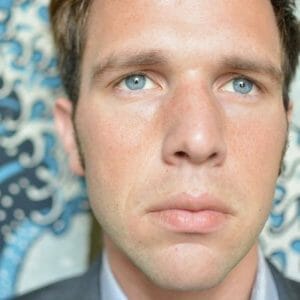 James Norwood, MA, is a doctoral student in the Clinical Psychology program at the California Institute of Integral Studies in San Francisco, California. Norwood is presently working as a clinical intern, researching MDMA-assisted psychotherapy in concert with the Multi-Disciplinary Association of Psychedelic Studies, and is on the board of directors of Free Association Inc., a nonprofit organization that provides alternatives to treatment for people with altered experiences of reality in the Bay Area.
James Norwood, MA, is a doctoral student in the Clinical Psychology program at the California Institute of Integral Studies in San Francisco, California. Norwood is presently working as a clinical intern, researching MDMA-assisted psychotherapy in concert with the Multi-Disciplinary Association of Psychedelic Studies, and is on the board of directors of Free Association Inc., a nonprofit organization that provides alternatives to treatment for people with altered experiences of reality in the Bay Area. About Michelle Anne Hobart, MA
 Michelle Anne Hobart, MA: is a practitioner of energy medicine and holistic health educator. She holds a BS in Biology, and an MA in Philosophy, Cosmology, and Consciousness. Currently, she is doing coursework in Integral Counseling Psychology at California Institute of Integral Studies. Michelle is an advocate for the Neurodiversity movement and a certified Spiritual Emergence Coach. She supports sensitive, empathic people whose gifts and experiences have been judged or oppressed and who are in the process of reclaiming and recovering their self-care, power, and personal truth. Michelle offers workshops, retreats, support groups, and one-on-one sessions.
Michelle Anne Hobart, MA: is a practitioner of energy medicine and holistic health educator. She holds a BS in Biology, and an MA in Philosophy, Cosmology, and Consciousness. Currently, she is doing coursework in Integral Counseling Psychology at California Institute of Integral Studies. Michelle is an advocate for the Neurodiversity movement and a certified Spiritual Emergence Coach. She supports sensitive, empathic people whose gifts and experiences have been judged or oppressed and who are in the process of reclaiming and recovering their self-care, power, and personal truth. Michelle offers workshops, retreats, support groups, and one-on-one sessions.
Matt Kay, Co-Founder of the East Coast Float Spa, joins Kyle on this episode of Psychedelics Today. This is another experiential episode where Kyle gets to float and report on his experience. Kyle and Matt also talk about the benefits of floating, the history, and how Matt got involved in the float business. We hope you enjoy this episode! Let us know what you think below in the comment section.
Learn more at psychedelicstoday.com
Bio - Leoni Joubert
Leonie uses different storytelling approaches to wander through the often unmapped terrain faced by all of us as we find ways to live together on an ever more tightly packed planet: climate, energy, environmental change, and hunger and malnutrition in the world of Big Food. Mostly, her stories try to give voice to a silenced environment, and the social injustices of a society where the divide between rich and poor has never been greater.
She has spent the better part of 15 years exploring these topics through books, journalism, communication's support to academics and civil society organisations, and non-fiction creative writing.

